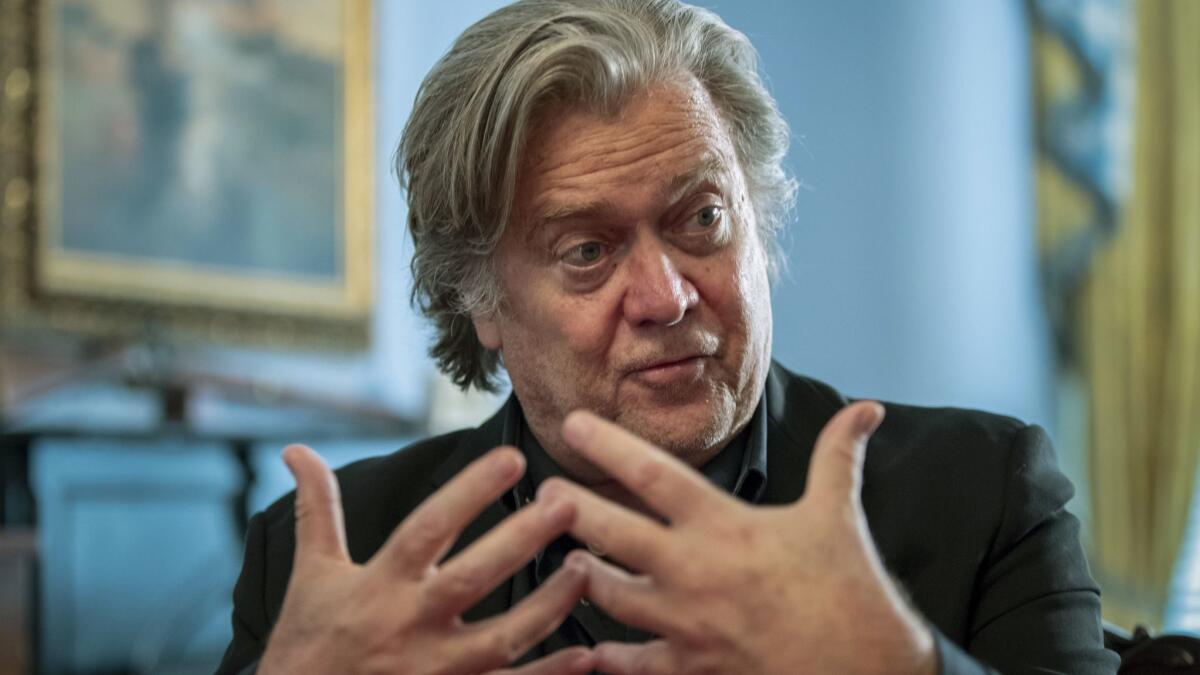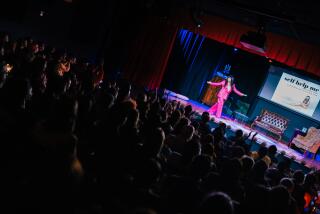Op-Ed: Steve Bannon is a bigot. There is no point in debating bigots

Pundits and opinionators like to think that political change comes through punditing and opinionating. To move the populace, all you need do is wheel out sparkly and provocative arguments, and then those arguments will be honed and sharpened through free debate. It seems natural to people who generate ideas for a living that ideas are the motive force behind politics.
It’s true that ideas can be powerful. But they aren’t the only powerful thing. Often real change is brought about not by new ideas but by solidarity — the willingness of a group to take collective action.
This was illustrated Monday when David Remnick, editor of the New Yorker, announced that former White House chief strategist Stephen K. Bannon was slated to appear at the New Yorker Festival.
Until he stepped down in January, Bannon was the executive chairman of Breitbart News, which provides a platform to the so-called alt right. Bannon himself has been linked to white nationalism and has made a career of bringing its toxic rhetoric into the mainstream.
Perhaps anticipating the controversy to come, Remnick told the New York Times: “I have every intention of asking him difficult questions and engaging in a serious and even combative conversation.”
But the backlash was fierce and swift. Legions of readers declared on social media that they were canceling their subscriptions to the New Yorker. The author Roxane Gay announced that she was pulling an essay she had been working on for the magazine. Kathryn Schulz, a New Yorker staff writer, said publicly that she was horrified by Remnick’s decision. And a number of high-profile festival guests — Judd Apatow, Jim Carrey, Jimmy Fallon — said they would not appear at the festival if Bannon attended.
“I’m out,” the comedian John Mulaney said on Twitter. “I genuinely support public intellectual debate, and have paid to see people speak with whom I strongly disagree. But this isn’t James Baldwin vs William F Buckley.”
The abandonment of liberty and justice for all isn’t an idea we should debate.
So Remnick quickly disinvited Bannon, saying in a statement: “ I don’t want well-meaning readers and staff members to think I’ve ignored their concerns. I’ve thought this through and talked to colleagues — and I’ve reconsidered.”
Predictably, some journalists and pundits hurried to defend Remnick, including Malcolm Gladwell, who wrote on Twitter: “I would have thought that the point of a festival of ideas was to expose the audience to ideas. If you only invite your friends over, it’s called a dinner party.”
Bannon called Remnick “gutless.”
Critics are now arguing that by dropping Bannon from its festival, the New Yorker is impeding the free exchange of ideas. What they miss, though, is that Remnick’s hand was forced. And it was forced by that other hallmark of a free society — the right to organize.
Remnick didn’t really choose to pull Bannon. The other people who had been asked, or hired, to appear at the festival essentially staged a work stoppage. On Labor Day, no less.
When people think about collective action, they don’t typically think about Jim Carrey refusing to appear at the New Yorker Festival. But he and the others are, in this context, working. And refusing to do the job comes with potential risks — possibly the loss of a fee, in some cases, but also potential blacklisting, negative publicity and online harassment from Bannon’s fan base.
Enter the Fray: First takes on the news of the minute from L.A. Times Opinion »
Had only one speaker refused to appear at the festival, Bannon may not have been dropped. As with all collective action, what turned the tide was solidarity. When people act together, they have more power than any one of them has alone.
Remnick said he intended to challenge Bannon’s ideas in open debate. But is there any point in debating Breitbart’s “black crime” vertical? What is gained by challenging Bannon to admit that when he says “globalists,” he means “Jews”?
You can’t argue down bigots, because bigotry has no logic. But you can take a stand against bigotry with your colleagues and fellow citizens. Rather than relying on a brilliant pundit to refute fascism, the other festival guests chose the latter path.
Driving Bannon from the New Yorker Festival is a small but meaningful victory. Bigots and aspiring authoritarians like him are trying to create a country in which immigrants, black people and other marginalized groups face daily terror, violence and imprisonment. The abandonment of liberty and justice for all isn’t an idea we should debate. It’s an idea we should reject together.
Noah Berlatsky is the author, most recently, of “The Consequences of Feminism: Women Film Directors.”
Follow the Opinion section on Twitter @latimesopinion or Facebook
More to Read
A cure for the common opinion
Get thought-provoking perspectives with our weekly newsletter.
You may occasionally receive promotional content from the Los Angeles Times.






